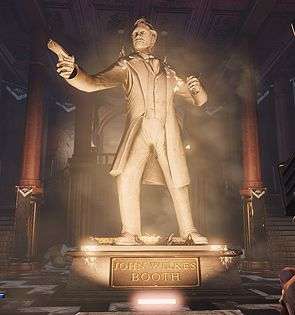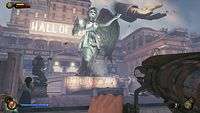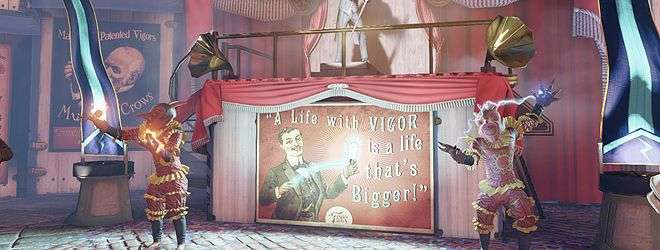BioShock Infinite – Review
by Edward

|
 When BioShock first asked us to look beneath the waves and enter the world of Rapture, it was a sight seldom-seen by most, and for many it became one of the definitive games of this generation. Combining incredible décor with cerebral shooting, an intelligent plot that few other first-person titles – even its own sequel – could hope to match and one of the most fascinating universes ever created all made for one of the greatest shooters ever. Several years ruling over the genre saw many competitors, but while some shone bright and many faded away, none could match the pinnacle that was the original BioShock: none could match the incredible setting, none could match the creative and strategic combat, heck, none could even match the relatively black-and-white morality system. After several delays and a relatively minor débâcle over its cover art, there finally comes BioShock Infinite – the sequel that takes the action out of the water and into the sky, aiming to usurp its predecessor as the King of the First Person Shooter, and if you come at the King, you best not miss.
When BioShock first asked us to look beneath the waves and enter the world of Rapture, it was a sight seldom-seen by most, and for many it became one of the definitive games of this generation. Combining incredible décor with cerebral shooting, an intelligent plot that few other first-person titles – even its own sequel – could hope to match and one of the most fascinating universes ever created all made for one of the greatest shooters ever. Several years ruling over the genre saw many competitors, but while some shone bright and many faded away, none could match the pinnacle that was the original BioShock: none could match the incredible setting, none could match the creative and strategic combat, heck, none could even match the relatively black-and-white morality system. After several delays and a relatively minor débâcle over its cover art, there finally comes BioShock Infinite – the sequel that takes the action out of the water and into the sky, aiming to usurp its predecessor as the King of the First Person Shooter, and if you come at the King, you best not miss.
Abandoning the city at the bottom of the ocean, BioShock Infinite takes to the skies as players are placed in the year 1912 and made to assume the role of one Booker DeWitt, a former Pinkerton detective in deep debt to the wrong people, and is thus forced to infiltrate Columbia with the instruction to “bring us the girl, and wipe away the debt”. The girl in question is Elizabeth, the daughter of Father Comstock, a man who used his religious piety to become the de-facto ruler of the city of Columbia, as well as the target of idolisation for its many inhabitants. Even before you enter the city proper, you’re forced to undergo a baptism to become part of their ultra-nationalist religion and accept Comstock as “the Prophet”, a title bestowed upon him thanks to his informed abilities to predict the future. Taking Comstock’s daughter back to New York turns out to be anything but simple, and before long DeWitt finds himself on the run as he is hunted down by Columbia’s law enforcement.
Stepping into the world of Rapture for the first time was one of the most iconic moments of this generation, and it’d be remiss if Infinite’s introduction failed to deliver. Luckily, and yet incredibly, Infinite’s opening managed to grasp me just as strongly as those first steps in the underwater city. One of the strongest cards in BioShock’s deck was the way that it built its world and slowly clued you in to the demise of the city of Rapture, and Infinite counters this with an opening that makes it clear it means to surpass the underwater shooter via every means possible. Your first moments in the city of Columbia are absolutely breathtaking, and seeing the floating splendour in its prime rather than a civilisation in decay is one of the most visually arresting sights I’ve ever laid eyes on. The amount of detail is absurd, and yet I couldn’t help but stand and watch a hummingbird go about its business for a minute or two before forcing myself to continue and soak in the environment around me. Even the smallest moments are packed with love and dedication, and it’s hard not to fall in love with Columbia before the veneer begins to fade and the cracks start to show. Stylistically, there’s absolutely nothing like it, and it’s without a doubt the most beautiful game I’ve ever had the pleasure of laying my eyes on.
 Detail seems to pour from every orifice, with the world seeping in an American Steampunk aesthetic that helps punctuate the influence of American Exceptionalism that permeates throughout the art style as well as the main themes of the story itself. Having a window into an ultra-nationalist version of early 20th century America is not only gorgeous to look at, but also subtly terrifying as the greater details begin to unravel and the evidence becomes clear that the Founders are far worse than just a century-old version of the Tea Party. Observing Columbia as a place that considers itself more American than America manages to send shivers down your spine, and also reminds you of the horrendous evils of the past as you’re forced to become a participant in this alternative view of history. It’s fascinating to watch the different factions that permeate the world, from the upper-class Columbians to the oppressed Vox Populi to the haunting Order of the Raven, who literally vilify Lincoln and consider him as Satan and John Wilkes Booth a martyr.
Detail seems to pour from every orifice, with the world seeping in an American Steampunk aesthetic that helps punctuate the influence of American Exceptionalism that permeates throughout the art style as well as the main themes of the story itself. Having a window into an ultra-nationalist version of early 20th century America is not only gorgeous to look at, but also subtly terrifying as the greater details begin to unravel and the evidence becomes clear that the Founders are far worse than just a century-old version of the Tea Party. Observing Columbia as a place that considers itself more American than America manages to send shivers down your spine, and also reminds you of the horrendous evils of the past as you’re forced to become a participant in this alternative view of history. It’s fascinating to watch the different factions that permeate the world, from the upper-class Columbians to the oppressed Vox Populi to the haunting Order of the Raven, who literally vilify Lincoln and consider him as Satan and John Wilkes Booth a martyr.
Yet, some of the greatest moments are being a passive observer in Columbia and letting everything happen around you. Nearly every incidental character seems to have a unique line or conversation waiting to be uttered, and while there are likely to be some that pass you by, the ones that you catch can make all the difference and can influence how you choose to impact the world. You’re given a more insidious view of the social dynamics at play when you see a lifeguard decline to save drowning children and refer to their deaths as “positively Darwinian”, and they can even dictate how you choose to proceed in forthcoming skirmishes. Halfway through I came across a guard awkwardly try to ask another out, only for her to rebuff his advances. Declining to shoot them both, I chose to possess the male guard, watch as he killed his female compatriot and then himself once the vigor had worn off and in doing so had created my own meta-story in the narrative; angry at being rejected, the man had killed the object of his desires, only to be overcome by grief and join her. While I’m unlikely to pen Shakespeare any time soon, it was just one of many additional tales I found myself creating in Columbia.
Also doing their part to help make Columbia such a vibrant and involving locale are the voxophones and kinetoscopes, the former a more primitive and bulky version dictaphone, the latter short silent films that help educate players on the history of Columbia. While the Kinetoscopes are altogether easier to find, the true reward comes from hunting down as many voxophones as possible, as the most intriguing ones are hidden about in the environment and behind locked doors, but are more liable to help explain some of the oddities and decipher the revelations you’re confronted with in the late stages of the story, as well as provide some of their own.
 Uncovering the many mysteries of BioShock Infinite becomes a joy, as for the most part the voxophones don’t require players to stray too far off the beaten path, and rewards those searching in dividends, with a greater insight of the city around them. All of these intricacies are awe-inspiring, and when you combine the voxophones with those incidental conversations, the insane amount of architecture and propaganda permeating every crevice and the absolutely genius idea of 1912 versions of pop songs from later decades (such as Tainted Love, Everybody Wants To Rule The World, God Only Knows and Girls Just Wanna Have Fun), Columbia isn’t just a thriving city, but undoubtedly one of the greatest fictional worlds to have ever existed.
Uncovering the many mysteries of BioShock Infinite becomes a joy, as for the most part the voxophones don’t require players to stray too far off the beaten path, and rewards those searching in dividends, with a greater insight of the city around them. All of these intricacies are awe-inspiring, and when you combine the voxophones with those incidental conversations, the insane amount of architecture and propaganda permeating every crevice and the absolutely genius idea of 1912 versions of pop songs from later decades (such as Tainted Love, Everybody Wants To Rule The World, God Only Knows and Girls Just Wanna Have Fun), Columbia isn’t just a thriving city, but undoubtedly one of the greatest fictional worlds to have ever existed.
Cementing that is that stunning cast of characters that populate BioShock Infinite, from glorified cultist Comstock to the charming oddities of the Luteces and even Booker himself, every performance is immaculately delivered and flawlessly written. Every character brings something unique to the table, and even the minor citizens and enemies come across as individually realised and well-delivered. Not a single performance went to waste, and watching the evolving personalities and characters of the more major players in the story is an absolute joy. There could have been some contention regarding the use of a non-silent protagonist, seeing as it’s a first-person title, but Booker’s remarks and thoughts do plenty to add to the experience, and it’s a delight to hear him make the occasional deadpan snark or hold his own in conversation with the people around him. This also spurs what felt like one of the most organic and remarkable aspects of BioShock Infinite – your interactions with Elizabeth.
 |
 |
 |
 |
 |
 |
When you’re first introduced to Elizabeth you’re also made privy to two vital plot points – her relationship with the Songbird and her ability to alter the fabric of reality. The Songbird is a massive mechanical bird charged with making sure that our heroine is unable to escape Columbia, and some of the more daunting moments come when it begins to hunt you down and attempts to re-capture Elizabeth. Purposefully styled after an abusive relationship, the complex dynamic at play adds a dimension to her character that is both heartbreaking and a spur to inspire the player to do what they can do to protect her. This is also bolstered by her unfolding relationship with Booker, which forms one of the most important aspects of the story, and is done so intelligently it stands as one of the most clever elements of a title that’s chock-full of genius.
 As you both explore and fight your way through Columbia, our heroine will often comment on the surroundings or attempt to learn more about Mr DeWitt as it becomes clear that she’s as much of a tourist to this universe as the player. Watching her dance on the beach, get excited over candy-floss or comment on Blacks and the Irish being forced to use separate toilets to the others seeming like an unnecessary complication are just a fraction of the moments that can help put a smile on your face. What makes these even more special is that some of these remarks and moments are optional to discover, and – save for one iconic moment involving a guitar in a basement – don’t freeze the action or wrestle control away from the player to achieve their effect. Seeing important plot points arise through casual conversations occurring outside cut-scenes feels surprisingly natural and means that the pace isn’t forcefully halted or badly manipulated to deliver the same information.
As you both explore and fight your way through Columbia, our heroine will often comment on the surroundings or attempt to learn more about Mr DeWitt as it becomes clear that she’s as much of a tourist to this universe as the player. Watching her dance on the beach, get excited over candy-floss or comment on Blacks and the Irish being forced to use separate toilets to the others seeming like an unnecessary complication are just a fraction of the moments that can help put a smile on your face. What makes these even more special is that some of these remarks and moments are optional to discover, and – save for one iconic moment involving a guitar in a basement – don’t freeze the action or wrestle control away from the player to achieve their effect. Seeing important plot points arise through casual conversations occurring outside cut-scenes feels surprisingly natural and means that the pace isn’t forcefully halted or badly manipulated to deliver the same information.
Booker’s mission is to snatch Elizabeth away from Columbia and take her to New York, and as you spend the majority of the story with her, many would rightly fear that it’d turn into an extended escort mission. However, Elizabeth is an absolute revelation, and as a companion is near-unparalleled. As Infinite tells you early on, there’s no need to worry about Elizabeth in the combat zone, as she can hold her own, but also as the majority of the enemies you face have strict instructions to not harm her but, instead, eliminate you. While this may seem like an immersion-breaker to some, I instead found it the preferable solution, as otherwise the combat would keep getting broken up by you having to revive her repeatedly, and there would be the possibility of failing through circumstances that were the fault of the AI rather than the player.
 Instead, Elizabeth will hide away and then scout the battlefield to point out particularly problematic enemies, as well as find and throw you supplies depending on what is more pertinent; if you’re running out of ammo then she’ll give you more bullets for your currently-equipped weapon, if you’re running out the salts needed to utilise vigors then she’ll find them, and if you’re on death’s door then you’ll soon find a medical kit being thrown your way. These aren’t done on demand, and depending on the size of the skirmish then she may only be able to throw one or two items, though she’ll alert Booker as to what she’s going to try and find or if she’s unable to gather anything, allowing you to react accordingly. Thankfully, this is never abused to an extent where you can instantly win any fight as long as Elizabeth’s by your side, but it’s instead used as a way to turn the tide in your favour, and success depends entirely on how you choose to fight.
Instead, Elizabeth will hide away and then scout the battlefield to point out particularly problematic enemies, as well as find and throw you supplies depending on what is more pertinent; if you’re running out of ammo then she’ll give you more bullets for your currently-equipped weapon, if you’re running out the salts needed to utilise vigors then she’ll find them, and if you’re on death’s door then you’ll soon find a medical kit being thrown your way. These aren’t done on demand, and depending on the size of the skirmish then she may only be able to throw one or two items, though she’ll alert Booker as to what she’s going to try and find or if she’s unable to gather anything, allowing you to react accordingly. Thankfully, this is never abused to an extent where you can instantly win any fight as long as Elizabeth’s by your side, but it’s instead used as a way to turn the tide in your favour, and success depends entirely on how you choose to fight.
Additionally, Elizabeth has the aforementioned ability to warp reality around her by exploiting ‘tears’ in the fabric of the universe, allowing her to conjure additional objects in the environment that can be used to assist Booker in the midst of gunfire. This then adds another level of strategy to the proceedings, as players than have to make split-decisions as to what Elizabeth should bring into reality and when, as only one tear can be activated at one time; do you summon some temporary cover, a pile of health packs or a kick-ass Tesla coil? Outside of combat, she’s also adept at lock-picking, and will set about opening up extra areas in the environment provided the players has enough lock-picks, and if they don’t, then she’ll help spot some in the backgrounds that you may have missed. These unlocked areas most often contain extra money, voxophones, an incentive to re-explore a previous area for an extra bonus, new gear or infusions.
Infusions provide yet another level of thought to battle, as your health, shield and salt level can be levelled up through their use. It is imperative to use these wisely, as each Infusion is a one-use offer, and there are only ten levels on offer for each of the battle-vital stats, meaning that players will be more than likely made to carefully consider what needs the most improvement. As in previous iterations in the series, neither health nor salts – Infinite’s equivalent of EVE, allowing players to use their vigors – regenerate, but the shield – a series first – does, though its meter is far smaller than the health bar, so players can’t rely on it and must still approach every battle with caution and considered thought.
 |
 |
 |
 |
 |
 |
As well as Infusions, Infinite also offers gear. While the simplest explanation would be to compare them to the tonics of old, gear instead focuses on adding modifications to your combat abilities, rather than offering minor increments or passive abilities. Rather than having a slightly-faster hacking speed, players can instead look forward to filling their four gear slots with modifications that bestow double weapon damage at death’s door, enemies that temporarily become ghost allies upon death or the ability to set every nearby enemy ablaze when landing a sky-strike. Instead of adding minor changes, it’s a lot easier to use gear to set up your Booker for a particular fighting style, and this can be changed at will in the gear menu, meaning that it’s easier to swap tactics on the fly if need be.
 Plasmids are a thing of the past (or future, relatively speaking), and instead Booker can consume vigors, bestowing upon him a variety of abilities from summoning crows, sending enemies floating into the air, and possessing machines and enemies alike to do your bidding. For the most part, these vigors are quite distinct from the familiar plasmids, though shock jockey is essentially the electro-bolt in all but name and Devil’s Kiss is just a trickier to master Incinerate. However, vigors do have a number of key advantages and improvements, with one of these being that most have an alternative ability that doesn’t require levelling up to unlock or more salt to unleash; some of these alternative abilities take the form of traps, which activate upon an enemy’s presence, while others allow you to repel attacks or draw enemies closer.
Plasmids are a thing of the past (or future, relatively speaking), and instead Booker can consume vigors, bestowing upon him a variety of abilities from summoning crows, sending enemies floating into the air, and possessing machines and enemies alike to do your bidding. For the most part, these vigors are quite distinct from the familiar plasmids, though shock jockey is essentially the electro-bolt in all but name and Devil’s Kiss is just a trickier to master Incinerate. However, vigors do have a number of key advantages and improvements, with one of these being that most have an alternative ability that doesn’t require levelling up to unlock or more salt to unleash; some of these alternative abilities take the form of traps, which activate upon an enemy’s presence, while others allow you to repel attacks or draw enemies closer.
Another difference is that the salt meter gives you a clear indication of how many uses of that particular vigor can be used before you need to replenish it, allowing you think more strategically or consider when the best time is to pick up another bottle in battle. Vigors can be levelled up – provided a player has enough cash – and as it’s unlikely that you’ll be able to buy every modification by journey’s end, some tough decisions will have to be made. For the most part, these modifications offer a boost in power, a reduction in salt level, or add another ability, such as chained-lightning, a cluster-bomb effect or turning any victim of a vigour into a trap ready to be sprung on an over-zealous enemy. If that wasn’t enough, there are up to eight different vigor combinations, encouraging some experimentation and incredibly satisfying results when you first see a swarm of fire crows terrorising your aggressors.
The use of vigors alone won’t see you standing victorious at the end of every gunfight, as instead – like Elizabeth’s powers – they need to be used in tandem with every other tool at your disposal as no one ability can win you the conflict outright. What is most satisfying about the combat in Infinite is that while you’re constantly up against the odds, there never feels like there are too many enemies trying to gun you down, meaning that fights are often battles of survival rather than an exercise in domination. Granted, some players may find some vigors less effective than others, but this – like the gear – comes down to what strategy the player would like to or is more comfortable using at that time, as some set-ups or abilities might not be what is best at that particular time. This is emphasised more when Booker is pitted against the Heavy-Hitters, significantly tougher foes consisting of the perpetually-burning Firemen, crank-gun wielding mechanised versions of the founding fathers known as the Patriots, and the gorilla-like human-mechanical hybrids known as the Handymen. Utilising the right tactics when facing these foes is imperative, as some weapons are more effective than others, and each Heavy-Hitter is immune to a certain type of vigour and some are more affected by others.
 |
 |
 |
 |
 |
 |
Keeping your cool is of the essence, as panicking will often see you getting dragged away by Elizabeth to be revived at a cost, and though you’ll regain some of your health, salt and ammo back, so too will any remaining foes see some of their health return, so death becomes far more of a punishment than a slap on the wrist. While this isn’t an issue for the vast majority of the story, this can become slightly problematic during any conflict involving a Handyman, as these locations often lack an area to effectively recover and let the shield recharge, while the Handymen can traverse great expanses of land very quickly and knock you down with only two swings, so it’s entirely possible to see yourself taken out of commission, revived and knocked down again within a matter of seconds if you don’t act straight away or don’t know the best way to deal with them.
Adding to the more dynamic and tactical flow of combat in comparison to its predecessors, Infinite only allows players to carry two weapons at a time. Normally an annoying limitation bought about from the success of the Halo franchise, in Infinite it brings a subtle sense of desperation to extended gunfights. With only a few enemies to lay waste to there’s no sense of worry, but during more prolonged conflicts it soon becomes imperative to either swap weapons or try something different out. While having more weapons in previous iterations was a welcome relief, action didn’t feel as frantic in the latter stages, as players could simply empty their gun then move on to one of seven other weapons. Like the vigors, weapons can be modified provided the player has enough cash, though these have more upgrade slots than their superpowered-counterpart, with modifications available allowing accuracy, power or ammo capacity boosts. Similarly, Booker can quick-swap between two vigors at a time, meaning that it’s a lot easier to chain combinations, while holding down the swap button will bring up the dial, allowing Booker to select between the vigors he has accumulated at that point in the story.
Not only is the combat the most satisfying and fun I’ve ever had the pleasure of playing in a first-person shooter (there’s even an option in the menu to make numbers come out of your enemies à la Borderlands), but Infinite also adds the Skyline – a rail-based transportation system that Booker and Elizabeth can use to traverse from one locale to another, reach alternative areas on the battleground and unleash devastating sky-strikes by launching at and landing on an unsuspecting foe below. Activated by the skyhook – one of the first items Booker gets his hands on in Columbia and a formidable mêlée weapon to boot – the Skyline makes for some of the most exciting moments as you zip through the environment at breakneck speeds and fight enemies on multiple fronts. It feels wholly unique, is an insane amount of fun, and helps solidify Infinite’s combat as second to none.
Equally unrivalled is the intricate narrative, which stands as the best a first-person shooter has ever seen, and may stand as the finest the generation and even the medium has ever witnessed. Eschewing the storytelling format of the original BioShock, which ran as a two-act narrative within a three-act single-player, Infinite instead keeps the player constantly guessing and unravelling the story even beyond the credits. Throughout the sixteen hours I played I never found the pace faltering, moral choices arbitrary or the story running out of steam, and even days later writing this review I’ve spent sleepless hours deciphering every single iota I possibly could, so powerful and outstanding is the narrative.
It’s so frustrating that I can’t delve into it any more, but even hinting as to anything beyond what I’ve already explained runs into spoiler territory. It’s taking every single bit of self-restraint I have to finish this review rather than run back to the world of Columbia and experience everything all over again. There’s even added incentive to do it thanks to 1999 mode, unlocked by completing the story or using the fabled Konami code in the right place, which reduces the number of spawn, health and ammo points, provides harsher punishments for dying, makes any upgrades permanent and can potentially leave players unable to progress unless they regress to an earlier save. Saving is no longer done manually, though it is possible for players to go back to earlier chapters from the main menu and these chapter checkpoints are normally done every fifteen minutes or so. Luckily, this makes it easier to revert back to an earlier point if you’re blocked off by a couple of glitches like the ones I suffered, where Elizabeth would be interrupted during an action and retaliate by freezing in place until I restarted, and another where a previously unlocked door wouldn’t open even though the padlock was clearly on the floor.
Even with those minor discrepancies, it’s nearly impossible for me to find a legitimate fault with BioShock Infinite. It features a world that transcends medium and stands as one of the most incredible fictional universes ever devised, an absolutely stellar cast and script, intense, strategic combat that rewards the player time and again, an AI companion who you never find yourself escorting, and a narrative that will be on the lips of those who’ve played it for the foreseeable future. It’s my absolute pleasure to say that while it isn’t perfect, it’s the closest the genre has ever been to a perfect title. BioShock Infinite is an unequalled experience, and stands as the best first-person shooter I have ever, ever played.
Pros- One of the most visually-arresting titles in existence
- An incredibly well-built world that makes you feel guilty to want to live in
- Exceptional cast and voice-work
- AI Companion that's fun to have around, helpful and never feels like an escort mission
- Stellar soundtrack that constantly surprises and provides stellar de-makes of iconic songs
- Infusions, Gear and Vigors are brilliant ways to keep play-styles and tactics feeling fresh
- Voxophones and upgrades provide plenty of incentive to explore the world and unravel its mysteries
- Intense combat that rewards quick-thinking and careful strategy
- Plenty of collectables and 1999 mode give you reason to come back and re-explore Columbia
- Amazing narrative that will prey on your mind long after the credits have rolled
- I suffered a couple of glitches
- Recovering around Handymen can be difficult
- I know I can never enjoy an FPS this much ever again
- Seriously, this may have ruined all other games for me
When your closest competitor is your nearly six-year old predecessor, you'd expect your superiority to be assured, but when that title is the original BioShock the competition becomes far more intense. However, BioShock Infinite bypasses every expectation, constantly surprises and provides such an unparalleled experience that it leaves its precursor in the dust. It may not be perfect, but it's one of the most amazing, unparalleled experiences our medium could ever hope to offer and almost effortlessly assumes the throne as the King of the First-Person Shooter. I can't see it being displaced any time soon.
Last five articles by Edward
- Best of 2015: Journey's End: A New Beginning
- Journey's End: A New Beginning
- You Can't Choose Your Happy Ending
- Okay, Let's Fix Comedy In Games - The V-Effekt
- Time Keeps On Smashing Away


































Brilliant game, brilliant review. I bought this on release day and even with a 6 month old baby screaming the house down, I am making time to play this.
I’m probably 5 or 6 hours in so maybe not qualified yet to form a full ‘review’ depth opinion on the game…but I feel like I’m slightly swimming against the tide of opinion.
Don’t get me wrong – it’s definitely an excellent game, one of the best for a long time. But something just ins’t clicking for me at the moment…Elizabeth feels like the only thing in the world that I can engage with at the moment – everything else seems a little bit smoke and mirrors, a little bit trying too hard. It could be a symptom of not being that far through yet, but I’m yet to completely engage with this game, despite actually quite enjoying it to this point.
Even though I’m inclined to say this one is the better game, I think I prefer BioShock’s more survival horror atmosphere than Infinite’s more, dare I say it, shoot-em-up feel. BioShock was a great shooter but not because of the actual shooting, whereas Infinite’s can confidently stand up to the genre’s best. Either way, it would be petty to compare every little detail because they’re both mind-blowingly brilliant games. Mr Levine, I salute you.